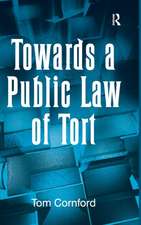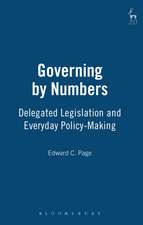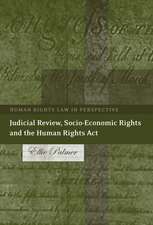Access to Justice: Beyond the Policies and Politics of Austerity
Editat de Ellie Palmer, Tom Cornford, Yseult Marique, Audrey Guincharden Limba Engleză Hardback – 27 ian 2016
| Toate formatele și edițiile | Preț | Express |
|---|---|---|
| Paperback (1) | 233.26 lei 6-8 săpt. | |
| Bloomsbury Publishing – 25 apr 2018 | 233.26 lei 6-8 săpt. | |
| Hardback (1) | 514.01 lei 6-8 săpt. | |
| Bloomsbury Publishing – 27 ian 2016 | 514.01 lei 6-8 săpt. |
Preț: 514.01 lei
Preț vechi: 653.26 lei
-21% Nou
Puncte Express: 771
Preț estimativ în valută:
98.36€ • 107.27$ • 82.94£
98.36€ • 107.27$ • 82.94£
Carte tipărită la comandă
Livrare economică 24 aprilie-08 mai
Preluare comenzi: 021 569.72.76
Specificații
ISBN-13: 9781849467346
ISBN-10: 184946734X
Pagini: 336
Dimensiuni: 156 x 234 x 15 mm
Greutate: 0.7 kg
Editura: Bloomsbury Publishing
Colecția Hart Publishing
Locul publicării:London, United Kingdom
ISBN-10: 184946734X
Pagini: 336
Dimensiuni: 156 x 234 x 15 mm
Greutate: 0.7 kg
Editura: Bloomsbury Publishing
Colecția Hart Publishing
Locul publicării:London, United Kingdom
Caracteristici
The contributors discuss access to civil and administrative justice in constitutional democracies within the dictates of austerity.
Notă biografică
Ellie Palmer is an Emeritus Professor of Law and Tom Cornford, Yseult Marique and Audrey Guinchard are Senior Lecturers in Law, all at the University of Essex.
Cuprins
Introduction Tom Cornford, Audrey Guinchard, Yseult Marique and Ellie PalmerPart I: Access to Justice: Theoretical, Legal and Policy Background1. Access to Justice: The View from the Law Society Andrew Caplen2. The Meaning of Access to Justice Tom Cornford3. Principles of Access: Comparing Health and Legal Services Albert Weale4. Europe to the Rescue? EU Law, the ECHR and Legal Aid 3Steve PeersPart II: Pressure Points on the Justice System5. Access to Justice in Administrative Law and Administrative Justice Tom Mullen6. Immigration and Access to Justice: A Critical Analysis of Recent Restrictions Robert Thomas7. The Impact of Austerity and Structural Reforms on the Accessibility of Tribunal Justice Stewart Wright8. Thirteen Years of Advice Delivery in Islington: A Case Study Lorna Reid9. Complexity, Housing and Access to Justice Andrew Brookes and Caroline Hunter10. Access to Justice in the Employment Tribunal: Private Disputes or Public Concerns? Nicole Busby and Morag McDermont11. Renegotiating Family Justice Mavis Maclean CBE12. Access to Justice for Young People: Beyond the Policies and Politics of Austerity James Kenrick and Ellie PalmerPart III: Alternative Approaches to Funding Legal Services13. A Revolution in 'Lawyering'? Implications for Welfare Law of Alternative Business Structures Frank H Stephen14. CourtNav and Pro Bono in an Age of Austerity Paul Yates15. The French Approach to Access to Justice Audrey Guinchard and Simon Wesley16. How Scotland has Approached the Challenge of Austerity Sarah O'Neill
Recenzii
Running parallel to the steady erosion, at least in England and Wales, of what we had come, perhaps complacently, to regard as an entrenched human right, the seminar series on which this book is based looked carefully and realistically at both sides of the issue: the shrinking availability of public funds and the practical possibilities of doing more with less. The volume seeks in particular to distinguish between those inroads into access to justice which are unacceptable on any principled view and those which are either unavoidable or at least negotiable. Wherever possible it does so, in contrast sometimes to central government, from an ascertained evidence base.

















